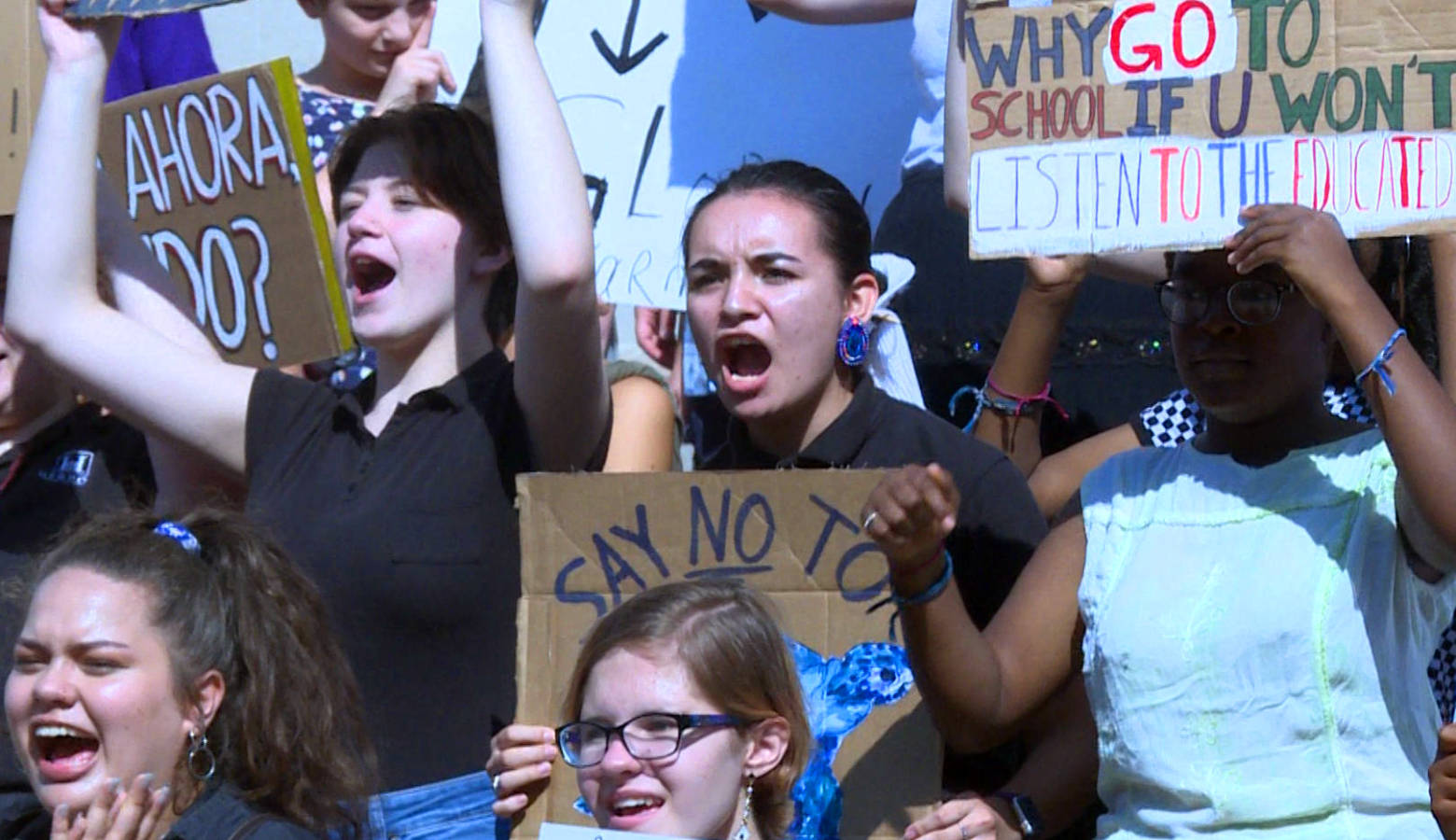Youth Climate Strike: We’ll Rally ‘Until Our Message Gets Across’

Hundreds of young people gathered in front of the Indiana Statehouse on Friday to demand action on climate change. This is the second Youth Climate Strike at the capitol in about six months.
“Personally I think we’re going to come back here as many times as we need until our message gets across,” says co-organizer Daniel Tanner, a sophomore at Carmel High School.
Organizers say they want 100 percent renewable energy by 2030, jobs for former workers in the fossil fuel industry, and a just transition away from coal and natural gas for communities of color. They delivered those demands to the governor, the legislature, and Indiana’s U.S. senators.
“I think people just see the rally and think that that’s all we’re doing. But this process has been building an environmental coalition in Indianapolis,” says co-organizer Tyler Mann, a senior at IUPUI.
Tanner says this climate strike is still centered around youth, but it was important to organizers to reach out to the wider community.
But young demonstrators weren’t only at the statehouse – they gathered in cities across the state.
A crowd of about 150 young people and adults gathered in South Bend to show support for the Green New Deal and urge politicians to make policy changes.
Julia McKenna is a student at the University of Notre Dame. She led an activist group that pushed the City to pass a climate ordinance last Spring, but she wants more from them.
“Even though South Bend has been really involved in sustainability, we want them to continue that commitment,” she said.
Students started a petition calling on South Bend Mayor Pete Buttigieg and other city officials to create firm climate change policies on a local level.
Purdue University, Lafayette
Activists gathered in front of Lafayette City Hall and, over the course of an hour, voiced concern about the impact of climate change.
The group wanted to hear from local officials, but none spoke at the event. But organizer Polly Barks says she hopes it’s the start of an ongoing local conversation.
“So this is kind of the introduction, and then we can start having those kind of more technical, bigger, deeper conversations after that,” Barks says.
Back on Purdue University’s campus, roughly 100 people gathered outside Purdue’s Wilmeth Active Learning Center for a teach-in – featuring university faculty and students, who spoke about their research on climate change.
Organizer and engineering professor Alice Pawley says the event was put together quickly, in the span of just a few weeks – but even so, it faced pushback.
“I understand the different schools were sending around a sort of reminder about Purdue faculty’s obligations not to compel students to participate in political activities,” Pawley says. “But if we frame climate change as political activities when it is in fact an existential threat, that is itself political.”
Indiana University, Bloomington
Students walked out of class and work Friday morning to demand action on climate change during a rally at Indiana University’s Dunn Meadow.
IU sophomore Eliza Dowd helped organize the Bloomington event. She says the protest is about bringing attention to global and local ways to fight climate change.
“Today is a very important day in history,” she says. “Today millions of people are walking out of their workplaces, out of their schools and are striking and rallying and saying ‘No more.’”
Those participating in the strike made a series of climate-related demands they presented to Indiana University and Bloomington’s mayor; they want IU to divest its money from fossil fuels, increase tree coverage on campus and reach net zero emissions in Bloomington.
Today is the first global walkout, and Dowd says the event will recur every Friday as part of the movement labeled #FridaysForFuture, spearheaded by young climate activist Greta Thunberg.
WVPE’s Annacaroline Caruso contributed reporting from South Bend. WBAA’s Taylor Haggerty contributed reporting from Lafayette. And WFIU/WTIU’s Autumn Schoolman contributed reporting from Bloomington.
Contact Rebecca at [email protected] or follow her on Twitter at @beckythiele.
Indiana Environmental reporting is supported by the Environmental Resilience Institute, an Indiana University Grand Challenge project developing Indiana-specific projections and informed responses to problems of environmental change.


